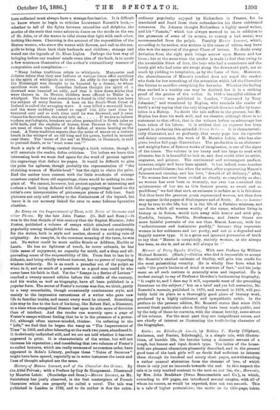21n, Essay on the Improvement of Time, with Notes of
Sermons and other Pieces. By the late John Foster. (G. Bell and Sons.)—It was in the first decade of this century that the Baptist Minister, John Foster, published a volume of essays which attained considerable popularity among thoughtful readers. And this WWI not surprising, for the writer, both in style and matter, showed a striking vein of originality. An essayist, in the common meaning of the term, he was not. No writer could be more unlike Steele or Addison, Hazlitt or Lamb. He has no lightness of touch, he never unbends, he has little sense of enjoyment, no capacity for mirth, and a deep and all- pervading sense of the responsibility of life. From first to last he is didactic, and being wholly without humour, has no power of imparting wisdom indirectly. He is as much a preacher out of the pulpit as when in it, and as much of a pessimist as a good man could be who never loses his faith in God. Yet the "Essays in a Series of Letters" reached a twenty-second edition before the middle of the century, and his works, as well as biography, have all been published in a popular form. The secret of Foster's success was due, we think, partly to a very remarkable, though occasionally cumbersome style, and mainly to the impressive earnestness of a writer who gave new life to familiar truths, and meant every word he uttered. Something also may be due to the fact of his being, like Robert Hall, a Dissenter, at a time when evangelical Dissent had upon its side more of devotion than of intellect. And the reader can scarcely open a page of Foster's essays without feeling that he is in the presence of a power- ful, although often narrow-minded, thinker. On referring to the "Life," we find that he began the essay on "The Improvement of
• Time " in 1805, and after labouring at the work two years, abandoned it. It is obviously unfinished still, and we are not told whether it has ever appeared in print. It is characteristic of the writer, but will not increase his reputation ; and considering that two volumes of Foster's so-called lectures, which are really sermons of no common order, have appeared in Bohn's Library, perhaps these "Notes of Sermons" might have been spared, especially as in some instances the texts and lines of thought adopted are the same.


































 Previous page
Previous page